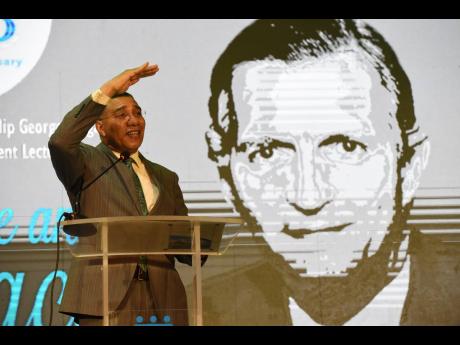HEART stood on shoulders of Norman Manley – Holness
Although former Prime Minister Edward Seaga has been widely credited with the formation of the HEART/NSTA Trust some 40 years ago, the concept behind its genesis was not originally his, according to the current head of Government, Andrew Holness,...
Although former Prime Minister Edward Seaga has been widely credited with the formation of the HEART/NSTA Trust some 40 years ago, the concept behind its genesis was not originally his, according to the current head of Government, Andrew Holness, who gives the credit to the nation’s pre-Independence leader, Norman Manley.
“The idea of HEART is not original. It stood on the shoulders of Norman Manley,” Holness said on Thursday as he delivered the Edward Phillip George Seaga Inaugural Human Development Lecture at The University of Technology, Jamaica.
“In the 1950s, Norman Manley also recognised that our youth were untrained. He established two youth training camps – Chestervale and Cobbla,” Holness said of the People’s National Party (PNP) founder.
The Cobbla Training Camp in Manchester and Chestervale Training Camp in St Andrew provided residential training over a year in an effort to get Jamaica’s human resource training up to speed, but, according to Holness, for some reason, it did not work.
Seaga, a former Jamaica Labour Party leader and the nation’s fifth prime minister, decided to tweak the model by developing a training institution with multiple skills training offerings while also focusing on the development of attitudes. In the process, he created a bridge for the world of work to be aligned with industry with a sustainable source of funding through mandatory deductions from salaries. By so doing, he created a well-structured vocational training system, which is now a critical institution of Jamaica.
“HEART, however, when taken within the context of a total structural readjustment of the Jamaican economy, would be an example of one of his (Seaga’s) policies that did not get caught in the narrow politics of the time because, truth be told, HEART was continued and supported through all administrations. HEART continues to be acknowledged as a very important institution of the architecture of Jamaica,” said Holness.
Undermined by apathy
The prime minister said that, during the period from the 1950s through to the 1980s, Jamaica’s economy was undermined by the inertia and apathy of the intellectual class, which failed to provide critical support in helping to raise awareness.
“In the ‘70s, the intention of the Government to create employment was good, but Government became the chief instrument of employment, and, if you look at the statistics during that period of time, you will see employment increasing. But, by the time 1980 came around, going through the oil crises and then a fallout in commodity prices, particularly bauxite, how was Government going to be able to maintain the employment that it created in the public service?
“The policy in the ‘50s, ‘60s and the ‘70s for industrialisation was about giving incentives, and many of the factories that we had attracted into Jamaica were done because we gave fiscal incentives, meaning that we gave up taxation and revenue in order to get factories, believing that these factories would create jobs.”
This failed, and the Michael Manley-led PNP administration of the 1970s tried to compensate with democratic socialism as its guiding principle, by seeking to create jobs in the public sector which could not be financed, Holness further added.
“So, by the time Seaga came to power in 1980, he had to contemplate a total restructuring of the Jamaican economy. That restructuring was along the lines of the introduction of policies that would deregulate, removing controls, and right-sizing public institutions. But, of course, it got caught in the politics of the time,” he told a captive audience inside the Alfred Sangster Auditorium.
“Those who were the opinion leaders, those who were the intellectuals of the time, those who were the academics and the professors who could have given the average man a better understanding of what needed to happen, tied up the necessary structural adjustment in political conflations and, for many years, we vacillated in policy. What was the right policy? What was the right thing to do?” asked Holness.
But HEART managed to escape being caught up in the narrow politics of the period, according to Holness, and continues to stand the test of time.

